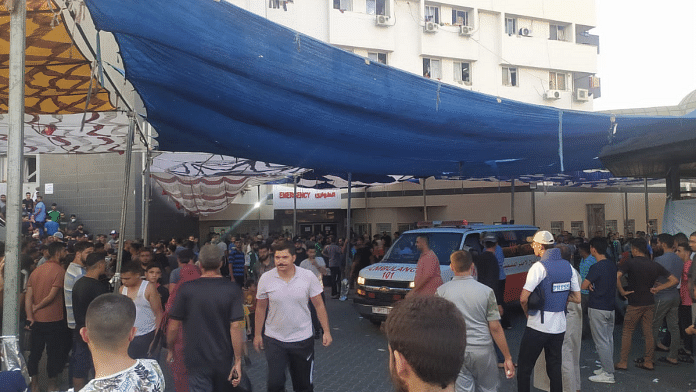New Delhi: For the past two weeks, Dr. Ahmad Almaqadma has been in distress every time he prepares for surgery at Gaza’s Al-Shifa Hospital. Medical supplies have run out, he said. Sterilising surgical equipment and treating wounds are getting more difficult with each passing day.
Dr. Almaqadma told ThePrint that makeshift methods such as using vinegar to treat bacterial wounds have become the last resort. “But, in all reality, Gaza’s healthcare system has collapsed.”
The plastic and reconstructive surgeon said that the hospital’s maximum capacity of 600 beds has been breached while extra beds have been set up in corridors. Despite this, he said, the space falls short as 100 more patients are in a dire need to be admitted.
And it is not just patients crammed in the hospital. “30,000 refugees are taking shelter at the hospital courtyard and in the corridors, they are people who lost their homes due to the bombardment. Now, they believe that the hospitals are safe spaces and won’t be targeted,” said Dr Almaqadma.
His house was destroyed in an air strike two weeks ago, he said.
The situation is no different at Gaza’s second largest hospital, Nasser hospital. Dr. Ahmad Moghrabi told ThePrint that he is in constant shock as he undertakes surgeries and discharges patients every two hours.
Almost every patient at the operation theatre (OT) suffers from burns, regardless of the nature of their other injuries, he said.
The facility, he noted, has run out of space. There is no option but to discharge patients in order to accommodate the injured.
During the first week of the war, after the Hamas attack on Israel on 7 October, Dr Moghrabi said he was witness to scores of patients coming in with burns that were caused due to the Israeli government using white phosphorus.
Amnesty International and Human Rights Watch, too, had accused Israel of using white phosphorus in military strikes in Gaza.
While such cases have stopped for now, the influx of patients went up at the 400-bed capacity hospital, which is running out of IV fluid, surgical gloves, gauze bandages and other medical essentials.
“I do not feel normal, I am in shock and in confusion over what is happening. I don’t even know how I mustered the courage to speak with you, because I am still in the OT and cannot get over what I have been through,” Dr Moghrabi told ThePrint.
Back at Al-Shifa Hospital, British-Palestinian surgeon Dr Ghassan Abu-Sitta narrated the psychological toll that the ongoing war has taken on patients and doctors.
He mentioned that earlier this week, a 16-year-old boy was brought to the operating room – his house was bombed while the family was having dinner.
“The boy’s family is dead, and he has burns on upper and lower limbs, and face. He will survive, but he is traumatised after what happened. People in Gaza, at the moment, are punch drunk — there is no other way to describe their condition,” said Dr Abu-Sitta
The bombing of Al-Ahli hospital has resulted in Al-Shifa hospital getting more patients, he said.
Dr Almaqadma, too, shared similar stories like his fellow surgeon. Most of his patients suffer from shrapnel wounds along with third degree and fourth degree burns. But it does not stop there, he said, adding that the patients also suffer from Post Traumatic Stress Disorder (PTSD) and “often wake up and wail on their beds, because of nightmares.”
“They say that their loved ones died before their eyes. A vast majority of the injured and dead are children and women, over 2,000 children and over 1,000 women have been killed,” he said.
The psychological stress and trauma for doctors in Gaza is beyond explanation, he said. Despite the loss of either home, family or colleagues, they log 16 to 18 hours daily, the surgeon added.
“There is no safe place in Gaza,” Dr Almaqadma said before he rushed back to operate on another patient.
(Edited by Tony Rai)



